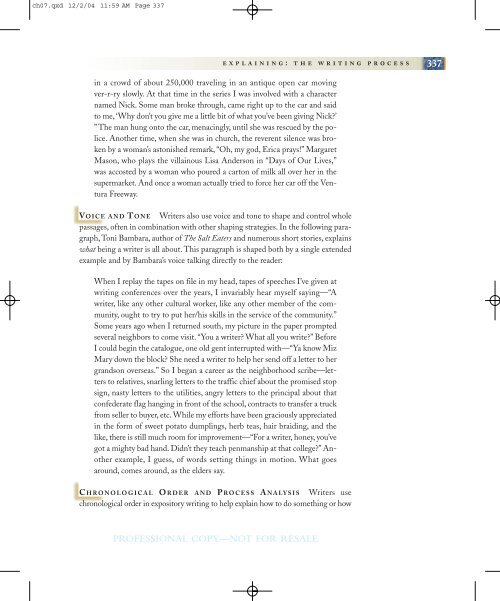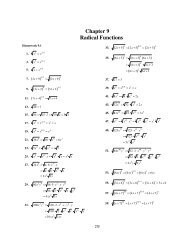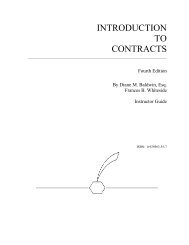A prolific painter of portraits before and after the French Revolution ...
A prolific painter of portraits before and after the French Revolution ...
A prolific painter of portraits before and after the French Revolution ...
Create successful ePaper yourself
Turn your PDF publications into a flip-book with our unique Google optimized e-Paper software.
ch07.qxd 12/2/04 11:59 AM Page 337<br />
explaining:<br />
<strong>the</strong> writing process<br />
337<br />
in a crowd <strong>of</strong> about 250,000 traveling in an antique open car moving<br />
ver-r-ry slowly. At that time in <strong>the</strong> series I was involved with a character<br />
named Nick. Some man broke through, came right up to <strong>the</strong> car <strong>and</strong> said<br />
to me, ‘Why don’t you give me a little bit <strong>of</strong> what you’ve been giving Nick?’<br />
” The man hung onto <strong>the</strong> car, menacingly, until she was rescued by <strong>the</strong> police.<br />
Ano<strong>the</strong>r time, when she was in church, <strong>the</strong> reverent silence was broken<br />
by a woman’s astonished remark, “Oh, my god, Erica prays!” Margaret<br />
Mason, who plays <strong>the</strong> villainous Lisa Anderson in “Days <strong>of</strong> Our Lives,”<br />
was accosted by a woman who poured a carton <strong>of</strong> milk all over her in <strong>the</strong><br />
supermarket. And once a woman actually tried to force her car <strong>of</strong>f <strong>the</strong> Ventura<br />
Freeway.<br />
V OICE AND T ONE Writers also use voice <strong>and</strong> tone to shape <strong>and</strong> control whole<br />
passages, <strong>of</strong>ten in combination with o<strong>the</strong>r shaping strategies. In <strong>the</strong> following paragraph,<br />
Toni Bambara, author <strong>of</strong> The Salt Eaters <strong>and</strong> numerous short stories, explains<br />
what being a writer is all about. This paragraph is shaped both by a single extended<br />
example <strong>and</strong> by Bambara’s voice talking directly to <strong>the</strong> reader:<br />
When I replay <strong>the</strong> tapes on file in my head, tapes <strong>of</strong> speeches I’ve given at<br />
writing conferences over <strong>the</strong> years, I invariably hear myself saying—“A<br />
writer, like any o<strong>the</strong>r cultural worker, like any o<strong>the</strong>r member <strong>of</strong> <strong>the</strong> community,<br />
ought to try to put her/his skills in <strong>the</strong> service <strong>of</strong> <strong>the</strong> community.”<br />
Some years ago when I returned south, my picture in <strong>the</strong> paper prompted<br />
several neighbors to come visit. “You a writer? What all you write?” Before<br />
I could begin <strong>the</strong> catalogue, one old gent interrupted with—“Ya know Miz<br />
Mary down <strong>the</strong> block? She need a writer to help her send <strong>of</strong>f a letter to her<br />
gr<strong>and</strong>son overseas.” So I began a career as <strong>the</strong> neighborhood scribe—letters<br />
to relatives, snarling letters to <strong>the</strong> traffic chief about <strong>the</strong> promised stop<br />
sign, nasty letters to <strong>the</strong> utilities, angry letters to <strong>the</strong> principal about that<br />
confederate flag hanging in front <strong>of</strong> <strong>the</strong> school, contracts to transfer a truck<br />
from seller to buyer, etc. While my efforts have been graciously appreciated<br />
in <strong>the</strong> form <strong>of</strong> sweet potato dumplings, herb teas, hair braiding, <strong>and</strong> <strong>the</strong><br />
like, <strong>the</strong>re is still much room for improvement—“For a writer, honey, you’ve<br />
got a mighty bad h<strong>and</strong>. Didn’t <strong>the</strong>y teach penmanship at that college?” Ano<strong>the</strong>r<br />
example, I guess, <strong>of</strong> words setting things in motion. What goes<br />
around, comes around, as <strong>the</strong> elders say.<br />
C HRONOLOGICAL O RDER AND P ROCESS A NALYSIS Writers use<br />
chronological order in expository writing to help explain how to do something or how<br />
PROFESSIONAL COPY—NOT FOR RESALE

















